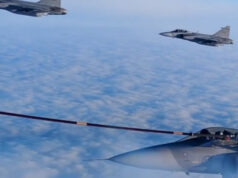The Ministry of Defence has confirmed ongoing discussions with the European Union to implement the Security and Defence Partnership (SDP) announced in May, aimed at enhancing interoperability, mobility, and resilience across European and NATO-aligned defence structures.
Responding to a series of written questions from James Cartlidge MP, Defence Minister Luke Pollard repeatedly emphasised that the SDP is designed to “strengthen NATO, the cornerstone of the UK’s defence” and complement existing bilateral ties with key European allies such as France, Germany, Poland, Italy, and Norway.
While details remain under negotiation, Pollard stated that the agreement will enable “dialogue and cooperation on key issues like Ukraine, space, hybrid, maritime security and resilience of critical infrastructure.” He added that the exchanges will be “flexible and scalable according to need.”
In response to queries about UK participation in EU-led education and training programmes, Pollard confirmed that officials are exploring options such as increased involvement in the European Security and Defence College (ESDC) and potential secondments to and from EU institutions. These initiatives are subject to the ongoing development of formal arrangements, including a possible Administrative Arrangement with the European Defence Agency (EDA).
“Any commitment – whether financial or non-financial – will provide value to the UK taxpayer and deliver the UK’s defence,” Pollard noted in all five responses.
The UK is also considering the terms under which EU personnel could participate in UK-led training activities. Pollard indicated that any cooperation would need to align with broader NATO planning and UK national defence objectives. The government is evaluating participation in selected Permanent Structured Cooperation (PESCO) projects that “bolster our NATO warfighting plans.”
The minister also confirmed that UK diplomatic and defence posts in third countries may increase cooperation with EU missions in those locations, particularly where shared objectives such as stability, deterrence, and crisis prevention are involved.
The implementation of the SDP will be overseen jointly by the Defence Secretary and the Foreign Secretary. According to Pollard, the MOD and FCDO are in the process of defining the modalities, including how joint initiatives such as information exchanges, joint training, and secondments would be structured.
The government has repeatedly stated that participation in EU defence projects will be assessed on a case-by-case basis, focusing on operational relevance and national interest.














Space would seem to be an absolute priority area where we can work with the EU. It’s likely the we will need more satellite arrays in the future for MTI as well as communications and navigation as we are too small to build everything required on our own.
Relying on the US for such capabilities as a single point of failure seems unwise as there is little we can offer to the US in such endeavours anyway.
There is also the possibility of investing in SIGNIT satellite capability however I think this is better done with the CANZUK partner nations on the account of five eyes.
I think there are more priorities than you can shake a stick at.
I worry that this is going to confuse the whole NATO enterprise. It’s probably a better idea to focus on building a list of things all the countries need to do better, get them into some list depending on priority and agree who will focus on what. What we absolutely need to do is ensure that in Europe we can do practically everything the Americans can do.
Absolute bollox – where do you dream this crap up from?
I’m not sure about your claim that we have little to offer in terms of satellites.
Many of the satellites that get used by the US and others have key components built in the UK, and I know that Surrey University, for one, have particular expertise in satellites.
I don’t think the USA shares any military satellites with anyone else so the US has no need or want for shared programs with us. The UK has first rate satellite technology and a history of building and operating satellites arrays. This is all very useful to the EU. So we have a common interest and need.
Frankly the French will sabotage anything uk wise here as they want all the euros flowing their way. See how they deal with actual Eu parters like Germany in their 6th generation aircraft and how the head of dassault spoke about the Belgians.